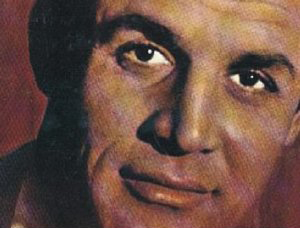Syrian and Arab people still remember the late great Syrian actor and singer Fahd Ballan, who was renowned for his national songs that call for adherence to land and love to the homeland and people. He started singing early in his childhood, and he used to sing at weddings and popular parties held in his village and nearby areas in Sweida city. Like most of his generation of artists who started their careers in the early sixties, he was exposed to a world of influences of those decades of music glory which was realized at the hands of important musicians such as Mohammed Abdel Wahab, Riyad al-Sunbati , Mohammad al-Qasdabji and many others. His voice and looks made him a symbol of masculinity and won him many acting roles in his youth. He was called by many music critics as the singer of manhood.
In 1957, he tried to join the Syrian Radio but he failed in the interview for the first time as he tried to imitate Abdel Wahab and Farid al-Atrash. But later, he managed to pass when he sang songs based on the heritage of his city.
Ballan’s first song was composed by Soheil Arafeh in 1959 celebrating the first unity in modern Arab history between Syria and Egypt.
The song was followed by many national and romantic songs that gained him wide reputation all over the Arab world. In Egypt, Ballan achieved remarkable success as great singers and composers such as Mohammed Abdul Wahab and Abdul Halim Hafez admired his talent and unique singing colour.
Fahd Ballan had an amazingly strong and beautiful voice. Many people think that some of his songs including “Larchab Haddak Yal Motor” and “Irkibna Al Houssan” constitute the basis for the type of Arabic music that was later known as “songs from the mounts”. Ballan’s voice was so sonorous and earthy like the land from which he came. It has its own effect, as he played with his tongue and basically, every part of his mandibles to create a very self-distinctive voice that even Umm-Khulthoum herself has said once that it was, “a new voice, nothing’s like his voice in the Arab world”.
Following his great success as a singer, Egyptian film production companies presented him with great offers to act in many films. He starred in fourteen films along with Dureid Lahham, Nihad Qalei’ and the Lebanese singers Sabah and Najah Salam.
During the October War of Liberation in 1973, Fahd returned to Damascus and presented scores of national songs through many national and zealous songs that focus on the love of homeland and readiness to offer sacrifices for it.
At the end of the 1970s, he returned to his birthplace Sweida and tried to establish a branch for Actors’ Union there. Throughout his eventful career, he presented about 1000 songs composed by outstanding Arab composers such as Baligh Hamdi, Farid al-Atrash, Filmon Wahbeh and many others. He died in 1997 aged 64, leaving behind rich legacy for generations. The great Palestinian poet Samih al-Qassem described Ballan as a unique artistic phenomenon that could not be repeated. He died of a brain haemorrhage leaving his legacy that is still loved by Arab audience.
K.Q.

